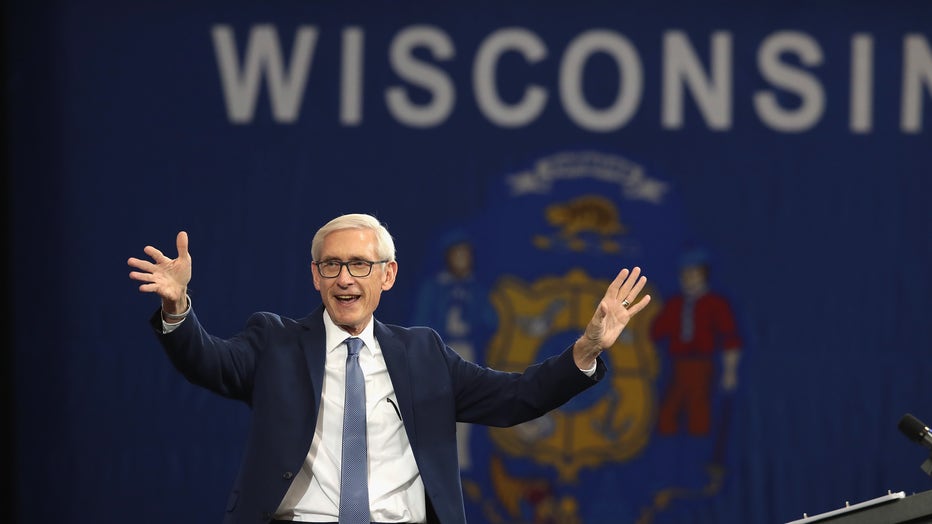Wisconsin Supreme Court blocks Evers’ stay-home extension
MADISON, Wis. - Wisconsin Gov. Tony Evers' administration overstepped its authority when it extended the governor's stay-at-home order through the end of May, the state Supreme Court ruled Wednesday.
The 4-3 ruling marks a defeat for Evers as Republican legislators, in the midst of the coronavirus pandemic and with the aid of the conservative-controlled high court, continue to chip away at the Democratic governor’s powers.
The decision invalidates the order but not immediately. The majority chose to leave it in place until May 20 to give the Legislature and Evers' administration time to come up with a new coronavirus plan.
RELATED: Virus-afflicted 2020 looks like 1918 despite science's march
Evers issued a stay-at-home order in March that closed schools and nonessential businesses. The closures battered the state economy, but Evers argued they were necessary to slow the virus' spread. The order was supposed to lift on April 24, but Department of Health and Human Services Secretary Andrea Palm, an Evers appointee, extended it to May 26.
Republicans, worried about the economic fallout, asked the Supreme Court on April 21 to block the extension. The Republicans said Palm exceeded her authority and argued that the extension amounts to an administrative rule, requiring legislative approval.
Evers’ administration countered that state law clearly gives the executive branch broad authority to quickly enact emergency measures to control communicable diseases. Attorney General Josh Kaul also noted that Evers' order was similar to that in at least 42 other states and has saved many lives.

FILE - Tony Evers, Democratic candidate for governor of Wisconsin, speaks at a rally in support of Wisconsin Democrats at North Division High School on October 26, 2018 in Milwaukee, Wisconsin. (Photo by Scott Olson/Getty Images)
Nearly seven out of 10 Wisconsin residents still back Evers’ “safer at home” order, based on a Marquette University Law School poll released Tuesday. However, the support had dropped from 86% in March to 69% in May, driven by increasing opposition from Republicans, the poll showed.
Evers' administration faced an uphill battle in convincing the court to keep the order in place. Conservative-leaning justices hold a 5-2 majority. Four of the the five conservative justices joined on the majority opinion. The fifth conservative, Brian Hagedorn, joined with liberal justices Ann Walsh Bradley and Rebecca Dallet in dissent.
Chief Justice Patience Roggensack wrote for the majority that the order equates to an emergency rule that Palm can't enact unilaterally. The order creates criminal penalties that Palm has no authority to create, she added.
RELATED: CoronavirusNOW.com, FOX launches national hub for COVID-19 news and updates
“Rule-making exists precisely to ensure that kind of controlling, subjective judgement asserted by one unelected official, Palm, is not imposed in Wisconsin,” Roggensack wrote for the majority.
The GOP has not offered any alternative plans. The state's chamber of commerce has suggested allowing all businesses to open at once while compelling higher-risk establishments and operations to take increasingly strict mitigation measures such as requiring employees to use protective gear.
The GOP move against Evers mirrors actions taken by Republican-controlled legislatures in other states, most notably against the Democratic governors in nearby “blue wall” states Michigan and Pennsylvania. All three are critical presidential battlegrounds in November.
Dallet wrote that the court's decision will “undoubtedly go down as one of the most blatant examples of judicial activism in this court's history. And it will be Wisconsinites who pay the price."
Dallet also took aim at the potential delay set up by a rule-making process, writing: “A review of the tedious multi-step process required to enact an emergency rule illustrates why the Legislature authorized DHS to issue statewide orders to control contagion. ”
For most people, the new coronavirus causes mild or moderate symptoms, such as fever and cough that clear up in two to three weeks. For some, especially older adults and people with existing health problems, it can cause more severe illness, including pneumonia, and death.
The GOP has been working to weaken Evers' powers since he ousted incumbent Republican Gov. Scott Walker in 2018.
During Walker's final weeks in office, Republicans adopted a set of laws that prohibited Evers from ordering the attorney general to withdraw from lawsuits, a move designed to prevent the governor from pulling Wisconsin out of a multistate lawsuit challenging the Affordable Care Act. The state Supreme Court has upheld those laws.
The high court also backed Republicans over Evers in the GOP's insistence on holding in-person voting for April's presidential primary despite the health risks of the coronavirus.
Separately, the court is considering a lawsuit from conservative law firm Wisconsin Institute for Law and Liberty that seeks to to rein in the governor's partial veto powers.



